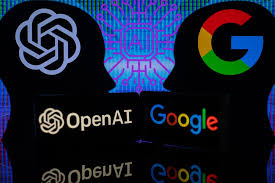The world of internet search is on the brink of a significant shake-up as OpenAI, the artificial intelligence powerhouse backed by Microsoft, unveils its latest innovation: SearchGPT. This new search engine prototype represents a bold challenge to Google’s long-standing supremacy in the search market, potentially redefining how we find and interact with information online.

SearchGPT is not just another search engine; it’s a glimpse into the future of AI-powered web navigation. Unlike traditional search engines that simply return a list of links, SearchGPT aims to provide more conversational and context-aware results. This approach could make finding information faster and more intuitive for users, addressing a common frustration with current search methods.
The timing of this launch is particularly significant. Google has dominated the search engine landscape for over two decades, with an estimated 90% global market share.
This near-monopoly has led to concerns about the diversity of information sources and the potential stagnation of search technology. SearchGPT’s entry into this space could spark a new era of competition and innovation in web search.
OpenAI’s strategy for rolling out SearchGPT is notably cautious and methodical. By initially limiting access to select individuals and publishers, the company is taking a measured approach to refine the technology and gather crucial user feedback. This controlled release allows OpenAI to address potential issues and fine-tune the search experience before a wider launch.
One of the most intriguing aspects of SearchGPT is its planned integration with ChatGPT, OpenAI’s hugely popular AI chatbot. This integration could create a powerful synergy, combining ChatGPT’s natural language processing capabilities with real-time web search functionality. The result could be a more interactive and intelligent search experience that goes beyond simple keyword matching.
OpenAI’s commitment to supporting publishers is another key feature of SearchGPT. By prominently citing sources and linking to original content, the platform aims to drive traffic to publishers’ websites. This approach could help address concerns about AI systems potentially diverting traffic away from content creators.
However, the launch of SearchGPT also raises important questions about the future of web search and information access.
As AI systems become more sophisticated in interpreting and presenting information, there are concerns about the potential for bias, misinformation, and the concentration of power in the hands of a few tech giants.
Moreover, the success of SearchGPT could have far-reaching implications for digital advertising, which is the primary revenue source for many internet companies, including Google.
A shift in search engine market share could lead to significant changes in how online advertising is bought, sold, and targeted.
As SearchGPT moves from prototype to public release, it will be closely watched by tech industry observers, policymakers, and users alike. Its success or failure could signal the direction of future AI applications in everyday digital tools.
While it’s too early to predict whether SearchGPT will successfully challenge Google’s dominance, its launch marks a significant moment in the evolution of web search. As AI continues to advance, we may be witnessing the early stages of a fundamental shift in how we interact with the vast sea of information on the internet.
For now, interested users can join OpenAI’s waitlist to get early access to SearchGPT. As the platform develops and expands, it may well usher in a new era of AI-enhanced web navigation, potentially transforming our digital experiences in ways we’re only beginning to imagine.



